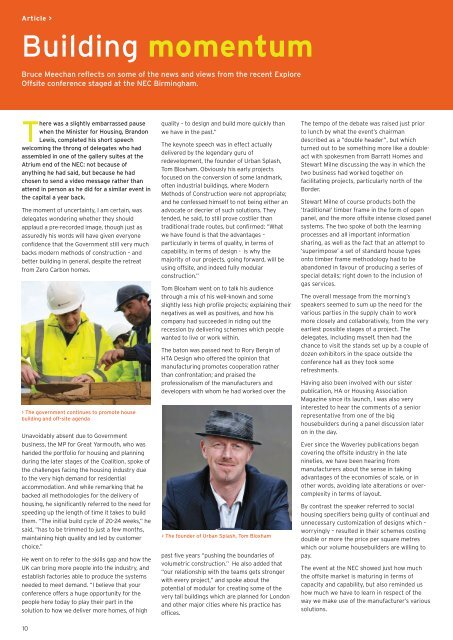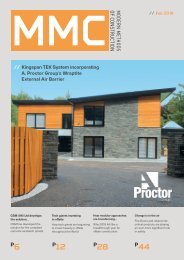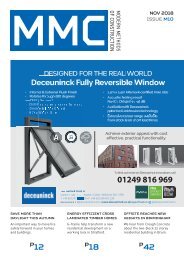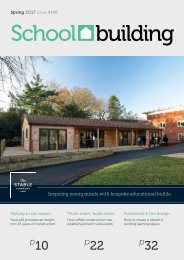You also want an ePaper? Increase the reach of your titles
YUMPU automatically turns print PDFs into web optimized ePapers that Google loves.
Article ><br />
Building momentum<br />
Bruce Meechan reflects on some of the news and views from the recent Explore<br />
Offsite conference staged at the NEC Birmingham.<br />
There was a slightly embarrassed pause<br />
when the Minister for Housing, Brandon<br />
Lewis, completed his short speech<br />
welcoming the throng of delegates who had<br />
assembled in one of the gallery suites at the<br />
Atrium end of the NEC: not because of<br />
anything he had said, but because he had<br />
chosen to send a video message rather than<br />
attend in person as he did for a similar event in<br />
the capital a year back.<br />
The moment of uncertainty, I am certain, was<br />
delegates wondering whether they should<br />
applaud a pre-recorded image, though just as<br />
assuredly his words will have given everyone<br />
confidence that the Government still very much<br />
backs modern methods of construction – and<br />
better building in general, despite the retreat<br />
from Zero Carbon homes.<br />
> The government continues to promote house<br />
building and off-site agenda<br />
Unavoidably absent due to Government<br />
business, the MP for Great Yarmouth, who was<br />
handed the portfolio for housing and planning<br />
during the later stages of the Coalition, spoke of<br />
the challenges facing the housing industry due<br />
to the very high demand for residential<br />
a<strong>cc</strong>ommodation. And while remarking that he<br />
backed all methodologies for the delivery of<br />
housing, he significantly referred to the need for<br />
speeding up the length of time it takes to build<br />
them. “The initial build cycle of 20-24 weeks,” he<br />
said, “has to be trimmed to just a few months,<br />
maintaining high quality and led by customer<br />
choice.”<br />
He went on to refer to the skills gap and how the<br />
UK can bring more people into the industry, and<br />
establish factories able to produce the systems<br />
needed to meet demand. “I believe that your<br />
conference offers a huge opportunity for the<br />
people here today to play their part in the<br />
solution to how we deliver more homes, of high<br />
10<br />
quality – to design and build more quickly than<br />
we have in the past.”<br />
The keynote speech was in effect actually<br />
delivered by the legendary guru of<br />
redevelopment, the founder of Urban Splash,<br />
Tom Bloxham. Obviously his early projects<br />
focused on the conversion of some landmark,<br />
often industrial buildings, where Modern<br />
Methods of Construction were not appropriate;<br />
and he confessed himself to not being either an<br />
advocate or decrier of such solutions. They<br />
tended, he said, to still prove costlier than<br />
traditional trade routes, but confirmed: “What<br />
we have found is that the advantages –<br />
particularly in terms of quality, in terms of<br />
capability, in terms of design - is why the<br />
majority of our projects, going forward, will be<br />
using offsite, and indeed fully modular<br />
construction.”<br />
Tom Bloxham went on to talk his audience<br />
through a mix of his well-known and some<br />
slightly less high profile projects; explaining their<br />
negatives as well as positives, and how his<br />
company had su<strong>cc</strong>eeded in riding out the<br />
recession by delivering schemes which people<br />
wanted to live or work within.<br />
The baton was passed next to Rory Bergin of<br />
HTA Design who offered the opinion that<br />
manufacturing promotes cooperation rather<br />
than confrontation; and praised the<br />
professionalism of the manufacturers and<br />
developers with whom he had worked over the<br />
> The founder of Urban Splash, Tom Bloxham<br />
past five years “pushing the boundaries of<br />
volumetric construction.” He also added that<br />
“our relationship with the teams gets stronger<br />
with every project,” and spoke about the<br />
potential of modular for creating some of the<br />
very tall buildings which are planned for London<br />
and other major cities where his practice has<br />
offices.<br />
The tempo of the debate was raised just prior<br />
to lunch by what the event’s chairman<br />
described as a “double header”, but which<br />
turned out to be something more like a doubleact<br />
with spokesmen from Barratt Homes and<br />
Stewart Milne discussing the way in which the<br />
two business had worked together on<br />
facilitating projects, particularly north of the<br />
Border.<br />
Stewart Milne of course products both the<br />
‘traditional’ timber frame in the form of open<br />
panel, and the more offsite intense closed panel<br />
systems. The two spoke of both the learning<br />
processes and all important information<br />
sharing, as well as the fact that an attempt to<br />
‘superimpose’ a set of standard house types<br />
onto timber frame methodology had to be<br />
abandoned in favour of producing a series of<br />
special details; right down to the inclusion of<br />
gas services.<br />
The overall message from the morning’s<br />
speakers seemed to sum up the need for the<br />
various parties in the supply chain to work<br />
more closely and collaboratively, from the very<br />
earliest possible stages of a project. The<br />
delegates, including myself, then had the<br />
chance to visit the stands set up by a couple of<br />
dozen exhibitors in the space outside the<br />
conference hall as they took some<br />
refreshments.<br />
Having also been involved with our sister<br />
publication, HA or Housing Association<br />
Magazine since its launch, I was also very<br />
interested to hear the comments of a senior<br />
representative from one of the big<br />
housebuilders during a panel discussion later<br />
on in the day.<br />
Ever since the Waverley publications began<br />
covering the offsite industry in the late<br />
nineties, we have been hearing from<br />
manufacturers about the sense in taking<br />
advantages of the economies of scale, or in<br />
other words, avoiding late alterations or overcomplexity<br />
in terms of layout.<br />
By contrast the speaker referred to social<br />
housing specifiers being guilty of continual and<br />
unnecessary customization of designs which –<br />
worryingly – resulted in their schemes costing<br />
double or more the price per square metres<br />
which our volume housebuilders are willing to<br />
pay.<br />
The event at the NEC showed just how much<br />
the offsite market is maturing in terms of<br />
capacity and capability, but also reminded us<br />
how much we have to learn in respect of the<br />
way we make use of the manufacturer’s various<br />
solutions.

















